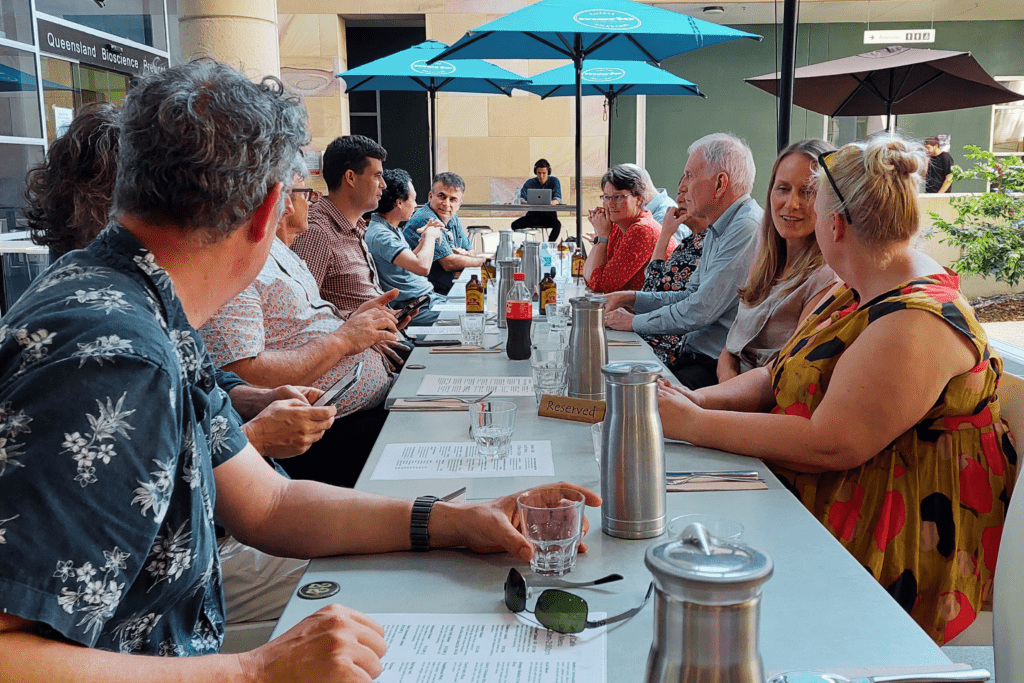The DivSeek Oceania Hub: Harnessing Biodiversity Resources across Australia, New Zealand and the Pacific
April 20, 2023Representatives of the DivSeek Regional Hub for Australasia recently convened at the University of Queensland to discuss the scope, use, and accessibility of plant biodiversity resources across Oceania. Bringing together experts from various disciplines, the meeting facilitated conversations about how to best maintain plant genetic resources that are comprehensive, traceable, and accessible to research.
This two-day Hub workshop was held at the University of Queensland in Brisbane, Australia, and hosted 21 attendees from Australia, New Zealand and Fiji. The meeting was substantially sponsored by the Environment Institute at the University of Adelaide, DivSeek International partner organization Illumina, along with support from DivSeek and BioPlatforms Australia.
An early decision by the group was to rename the extended Hub to represent Oceania. Among the attendees were Regional Hub co-leads Professor Andy Lowe (University of Adelaide, Australia) and Kioumars Ghamkhar (AgResearch, New Zealand) as well as Logotonu Meleisea Waqainabete, program leader of the Pacific Community (SPC)’s Genetic Resources division. The participants represented a transect through the diverse community of crop genebanks and biodiversity curators, researchers, data specialists and service providers in the region. Key infrastructure capabilities were represented through BioPlatforms Australia, Australian BioCommons and the Australian Reference Genome Atlas.
The workshop allowed participants to understand the commonalities and challenges across the breadth of activities in the region, and involved presentations and roundtable discussions on key issues in the conservation and use of plant genetic resources. Topics included: working with networks and communities, the role of collections and collectories, interoperable data systems and germplasm traceability, bioinformatics and analytical tools, genotyping and phenotyping tools, and managing intellectual property and access and benefit sharing (ABS). Together, the workshop attendees discussed current best practices and identified gaps for future work and collaboration in the region.

Members of the DivSeek Oceania Hub convene for lunch during their two-day intensive workshop at the University of Queensland in Brisbane. Photo credit: Nurmansyah Nurmansyah.
This first in-person meeting of the Hub had been delayed due to the pandemic, and was considered a great opportunity for collaboration and alignment of common goals by those who attended. It is also the first time that the Hub had extended collaboration to the Pacific Community (SPC) to broaden the scope from Australasia to Oceania.
“It’s just so important to get people together,” said Professor Andy Lowe. “Here we are defining and focusing the community that is DivSeek. I think everybody here is motivated by the biodiversity challenge.”
The workshop attendees represented all stages of the plant genetic resources pipeline: from genebank managers and plant breeders, to bioinformaticians and researchers. “Each particular partner has a different role, but there are key areas where we share common goals,” said Logotonu Meleisea Waqainabete. “That’s the meaning of DivSeek, to build on those common goals and see how we pool all the key players to create efficiencies in how we do our work.”
These sentiments were shared by Sally Norton, Leader of the Australian Grains Genebank. “No one group has all the knowledge, resources or capacity to solve the problems in front of us,” she said. “Collaboration is critical between Australia, New Zealand, the Pacific Islands and beyond.”
Community discussions across the two-day workshop culminated in a list of priority areas of work for the DivSeek Oceania Hub and its subsidiary working groups. “This [workshop] has been very informative, and hopefully, in the future, [it will] result in us making the right decisions,” said Kioumars Ghamkhar.
“Scientifically, collaboration is very important. The idea of hubs is good because it brings people within regions together. If we can work together at this level, we show that we can work together globally.”
Written by: Tori Millsteed & Nurmansyah Nurmansyah, University of Queensland, Australia
Back

Recent Comments